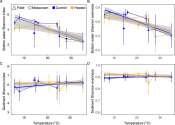Spiraling insights: Scientists observe mechanical waves in bacterial communities
A new study by researchers from The Chinese University of Hong Kong has reported the emergence of mechanical spiral waves in bacterial matter.

A new study by researchers from The Chinese University of Hong Kong has reported the emergence of mechanical spiral waves in bacterial matter.

Despite the pronounced seasonality in their habitat, the bacterial community in Arctic sediments is taxonomically and functionally very stable.
Cell & Microbiology
Feb 16, 2024
0
23

Using a novel microfluidic chip, ETH researchers led by Professor Roman Stocker and Estelle Clerc have shown that bacteria not only recognize small food molecules, but also swim towards large, complex polymers. A startup ...
Ecology
Feb 1, 2024
0
1

The human gut is home to hundreds of different bacterial species collectively known as the gut microbiome. A major health benefit these provide is to protect the gut against invading pathogens (disease-causing microorganisms) ...
Cell & Microbiology
Dec 14, 2023
0
137

Research at a long-term heated bay near Oskarshamn, in south east Sweden, provides a rare insight into how the Baltic Sea's coastal areas will be affected by climate change. Here, cooling water from the nearby nuclear power ...
Ecology
Nov 13, 2023
0
1

The field of artificial bone transplantation has faced a significant barrier: bacterial infection, a common culprit that often leads to transplant failure and, in severe cases, devastating consequences such as amputation.
Bio & Medicine
Oct 24, 2023
0
1

Viruses in soil may not be as destructive to bacteria as once thought and could instead act like lawnmowers, culling older cells and giving space for new growth, according to research out of the University of California, ...
Ecology
Oct 2, 2023
0
203

Known as the living skin of dryland ecosystems, biocrust contains diverse soil microorganisms that are essential to biocrust formation and the maintenance of multiple ecological functions.
Ecology
Aug 17, 2023
0
22

Biocrusts, known as the "desert skin," includes communities of cyanobacteria, algae, fungi, bacteria, lichen, and mosses. They can mediate both the physical and biological environments of dryland ecosystems.
Ecology
Jun 30, 2023
0
6

Have you ever been so hungry that you become angry, otherwise known as "hangry?" New research by Adam Rosenthal, Ph.D., assistant professor in the Department of Microbiology and Immunology, has found that some bacteria cells ...
Cell & Microbiology
Apr 3, 2023
0
52